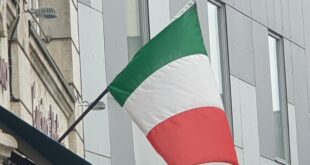First-ever exhibition on German colonialism opens in Berlin
Descendants of the victims of genocide have marched in Berlin to demand their direct involvement in reparations talks, reports Catherine Sasman.
More than 50 OvaHerero and Nama descendants of victims of the 1904–1908 genocide participated in a protest march in Berlin, Germany, on Sunday, 16 October to express their displeasure at being excluded from discussions between the two governments on restorative justice.
They consisted of OvaHerero and Nama from South Africa, Botswana, the USA, Canada, Britain and Germany and were joined by activists based in Germany.
The protesters were waving banners reading: “It cannot be about us without us” and “The government of Hage Geingob is a denier of the OvaHerero and Nama people’s genocide”.
The groups have consistently demanded to represent themselves directly in the talks, but their request has so far been denied by the Namibian government.
The protest march was preceded by a civil society congress entitled ‘Restorative Justice After Genocide’ occasioned by the Global Reparation Day on 12 October held as part of the United Nations Decade for People of African Descent aimed at open dialogue among the descendants of colonised peoples and former colonialists, as well as networking with civil society initiatives.
These events coincided with the opening of a special exhibition entitled ‘German Colonialism: Fragments Past and Present’ at the German Historical Museum which opened on 14 October and continues until May next year.
The exhibition deals with all former German colonies, the anti-colonial struggle and post-colonial periods of neo-colonialism, and the transition from formal to informal empire.
The museum stated that the exhibition examines the colonial ideology founded on the belief of a European superiority. It presents more than 500 objects from historical, ethnological and natural history collections as well as paintings, graphics, everyday objects, posters, documents and photographs.
Delegates at the Restorative Justice congress, however, criticised the museum for reportedly having excluded formerly colonised peoples in reference to issues of African-German history.
Civil organisations Berlin Postkolonial and the NGO alliance No Amnesty on Genocide said the museum had drawn up the concept of the exhibition largely without the involvement of African experts and reportedly also refused to invite OvaHerero and Nama representatives in Berlin to deliver a speech at the opening.
Another comment was that the exhibition, if transferred to Namibia, would be sufficient for a truth and reconciliation commission on the 1903 to 1908 war.
 THE AFRICAN COURIER. Reporting Africa and its Diaspora! The African Courier is an international magazine published in Germany to report on Africa and the Diaspora African experience. The first issue of the bimonthly magazine appeared on the newsstands on 15 February 1998. The African Courier is a communication forum for European-African political, economic and cultural exchanges, and a voice for Africa in Europe.
THE AFRICAN COURIER. Reporting Africa and its Diaspora! The African Courier is an international magazine published in Germany to report on Africa and the Diaspora African experience. The first issue of the bimonthly magazine appeared on the newsstands on 15 February 1998. The African Courier is a communication forum for European-African political, economic and cultural exchanges, and a voice for Africa in Europe.





























